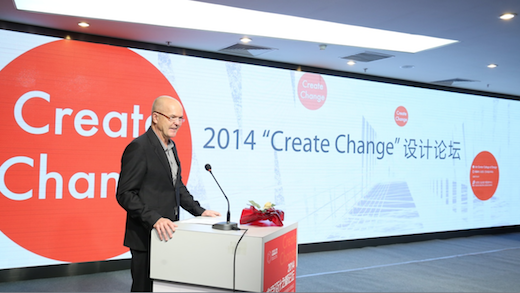
Art Center’s Mark Breitenberg welcomes participants to the 2014 Create Change Forums in Beijing.
In the latest issue of Dot magazine, we take a look at Art Center College of Design’s long history—nearly 60 years—of connections to Asia. Take a trip with us through time and across the Pacific as we look back in history and forward to the future. Today’s focus: the College’s growing relationship with China.
Whether it’s the impending arrival of China-made cars to the U.S. market or Film alumnus Michael Bay’s (BFA 88) Transformers: Age of Extinction breaking the $300 million barrier at the Chinese box office, these days all eyes are on the Middle Kingdom. And Art Center is no exception.
Just ask Mark Breitenberg, special assistant to the College’s president, who led the Create Change Design Forums, a three-day series of presentations and workshops which took place in China this September during Beijing Design Week.
At the packed forums, co-organized by Graduate Industrial Design (Grad ID) alumnus Lan Yu and sponsored by her company, Art Center leaders and alumni met with employees from 70 Chinese companies to introduce them to Art Center’s methodologies and creative processes.
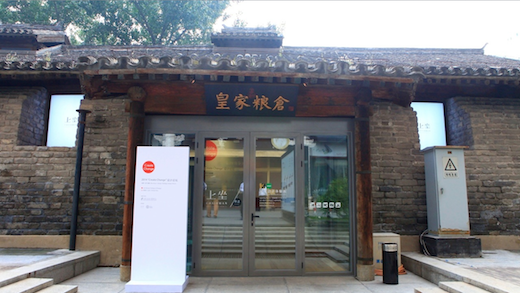
The “Branding + Design Strategy” forum took place in this restored Ming Dynasty building.
While Breitenberg cites the beautiful venues (one forum took place in a restored Ming dynasty building) and the presenters’ excitement as contributing to the inaugural initiative’s success, he says the participants’ engagement in the workshops was what made the event such a strong first step in building Art Center’s relationships with China.
“The ‘students’ were shy at first but by the end they were demonstrative and active,” says Breitenberg. “It was wonderful to see them come out of their cultural reserve and for a real dialogue emerge.”
With “dialogue” being the key word there.
“We didn’t want to go to Beijing and tell the participating companies how to do things our way,” said Breitenberg. “Rather, we presented their employees the tools of Art Center’s methodologies and asked them how they could apply them to situations, problems and challenges they face.”
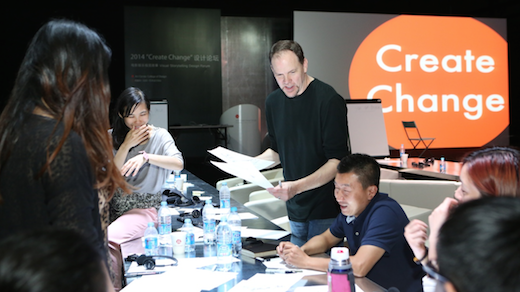
Entertainment Design Chair Tim Flattery works with students in the “Visual Storytelling” forum.
Individuals who spoke included:
- Environmental Design alumnus and Trustee Tim Kobe (BS 82), founder of Eight Inc., which has several offices throughout Asia, and Grad ID Chair Andy Ogden (BS 83) in the “Branding + Design Strategy” forum;
- Transportation Design alumnus Chris Bangle (BS 81), the first American Chief of Design at BMW who now heads up Chris Bangle Associates S.R.L. in Turin, Italy, and Graduate Transportation Systems and Design Executive Director Geoff Wardle in the “Transportation Design Process” forum; and
- Product Design alumnus and Hollywood concept artist and creature designer Neville Page (BS 90), who has worked on films like Avatar, Tron: Legacy and Star Trek Into Darkness, and Entertainment Design Chair Tim Flattery in the “Visual Storytelling” forum.
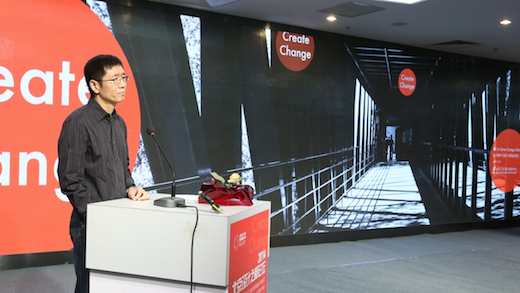
Alumnus De Liu, vice president and co-founder of Xiaomi, spoke at Create Change.
As a shining example of how Art Center’s creative processes can work in China, Breitenberg points to Grad ID alumnus De Liu, co-founder and vice president of Xiaomi, or simply “Mi,” one of China’s leading technology firms which recently became the third largest global seller of smartphones and has also announced plans to aggressively expand into India.
One of Xiaomi’s most innovative differentiators is how it facilitates and incorporates feedback from its loyal customer base. It’s a philosophy whose DNA can be traced back directly to Liu’s Grad ID thesis project: a system in which kids draw their own toy concept and, within a week, receive a plush toy that mirrors what they imagined.
“During the last four years at Mi, we have been putting into practice what I learned from Art Center,” said Liu, speaking at Create Change. “The results show that Art Center’s curriculum is both advanced and effective.”
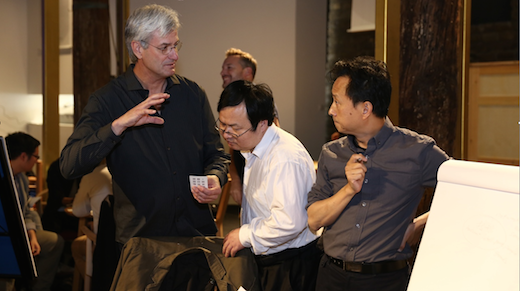
Grad ID Chair Andy Ogden works with students at the “Branding + Design Strategy” forum.
Liu told the audience that the College’s methodology has allowed the company to “think and do without hindrance,” and he shared a valuable lesson he learned in the Grad ID program: “With every design, Andy [Ogden] required a business plan to show how the [product’s] company would develop and grow over time. He taught us that we needed not only to be the best designers, but we also needed to be entrepreneurs and design strategists.”
It’s a lesson that Mi appears to have kept in the forefront of its mind.
Earlier this week, the company announced that they have entered into a strategic partnership with China’s top Internet TV company, Youku Tudou, to produce and distribute online content to bolster its “multi-screen ecosystem” of phones, tablets, smart TVs and other Internet-connected devices.
Take Youku Tudou’s monthly active user base that exceeds 500 million, its daily video views have passed the 800 million mark and add to that Xiaomi’s staggering 85 million active users of MIUI, its proprietary skin of Google’s Android operating system, and you can quickly see why China is simply impossible to ignore.
And why Art Center won’t be leaving anytime soon.
“We’re deep into planning for round two,” says Breitenberg of the already-in-motion plans for the 2015 Create Change Forums. “Next year we’re hoping to hold eight forums and possibly visit other cities in China as well.”
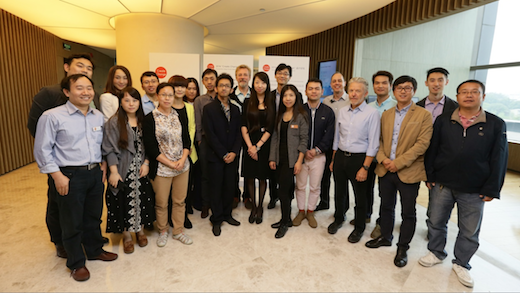
“Transportation Design Processes” forum students and instructors.
Check this space for upcoming stories about Art Center in Japan, Korea and Singapore.









Great to see the Art Center in Asia. I’ve been working in Asia for almost 20 years now and have met many successful alumni passing through during that time. Now I have my own agency in Singapore so if you’re ever in town please give me a shout. Without my education at Art Center, I doubt I would have come half has far in my career.